简单句并列句复合句
简单句、并列句、复合句文档

简单句英语句型分类根据语法形式,即句子的结构,英语的句子可分为简单句、并列句和复合句。
基本形式简单句的基本形式是由一个主语加一个谓语构成。
其它各种句子形式都是由此句型发展而来,如五大基本句型:五大基本句型1.主语+谓语谓语一定是动词这种句型简称为主谓结构,其谓语一般都是不及物动词,例:Things change.事物是变化的。
Nobody went.没有人去。
--Did you go by sea?你们走的是海路吗?--NO,we flew.不,我们是飞去。
2.主语+连系动词+表语也叫做主系表这种句型称为主系表结构,其实连系动词在形式上也是一种谓语动词,但实质上表语成了谓语,例:Mr. Turner is an artist.特纳先生是位画家。
The milk went sour.牛奶变酸了。
She became a lawyer.她当了律师。
注:我们平常所说的be动词有两种含义:1、助动词的be;2、作为连系动词的be;3.主语+谓语+宾语宾语有两种:间接宾语和直接宾语这种句型可称为主谓宾结构,它的谓语一般多是及物动词,例:We never beat children.我们从来不打孩子。
My sister will fix everything.我姐姐会料理一切。
4主语+谓语+宾语+宾语这种句型可称为主谓宾宾结构,其谓语应是可有双宾语的及物动词,两个宾语一个是间接宾语,一个是直接宾语,例:He gave the book to his sister.他把这本书给了他的妹妹。
I'll write you a long letter.我将写给你一封长信。
5.主语+谓语+宾语+宾补所谓宾语补足语就是补充说明前面的宾语这种句型可简称为主谓宾补结构,其补语是宾语补语,与宾语一起即构成复合宾语,例:I found the book easy.我发现这本书不难。
(形容词easy作补语)I'll let him go.我将让他去。
简单句 并列句 复合句
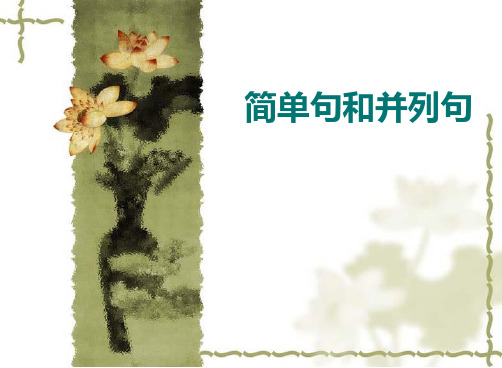
1. 陈述句(Declarative Sentences)
用来说明一个事实或陈述一种看法。例如: 1) Light travels faster than sound.
光比声传播速度快。(说明事实) 2) The film is rather boring.
这部电影很乏味。(说明看法)
要特别注意陈述句的否定结构
6. 状语 ( Adverbial )
常指修饰动词、形容词或副词的成分,修饰动词时 表示动作发生的时间、地点、目的或方式等;修饰 形容词或副词时表示它们的程度等。状语常由副词、 介词短语、动词不定式或分词短语等充当。 例如: 1. The miners work very hard. 2. She often helps Mike at school. 3. Hearing the news, he couldn’t help jumping.
3. 宾语 ( Object )
常指及物动词或介词后面使之意思完整的词或短语。 常由名词、代词、动词不定式或动名词短语等充当。 例如: 1. She has finished doing the experiment. 2. We like English and are good at it.
4. 表语 ( Predicative )
5)主 + 动 + 间宾 + 直宾 例如: My mother made me a new dress. 我母亲给我做了一件新衣裳。
IV. 并列句的常用连词
1. 我们常用并列连词and, not only…but also…等 连接联合并列句,用not only…but also… 时, 前面一句要用部分倒装 。例如: 1)Use your head, and you’ll find a way. 2)Not only does he want to come, but the students also need him.
简单句并列句复合句

能连接并列复合句的副词
• besides 而且,还有 • hence 由此,因此 • nevertherless然而 • moreoever加之,因此 • otherwise 否则,要不然 • then 然后,于是 • therefore 因此,要不然 • then 然后,于是 • therefore因此,所以 • thus 因而,从而 • i am not feeling very well today, otherwise i would do
• 第四种句型: • 主语+动词+间接宾语+直接宾语 • 如:He brings me cookies every day. • They gave him a watch.
• 第五种句型: • 主语+动词+宾语+宾语补足语 • 如:He asked me to answer this question. • We often see him play basketball alone.
• 如:The old woman lives alone, but she never feels lonely.
• we love peace but we are not afraid of war.
第三种:表示选择关系
• 此类并列连词有or, otherwise, either…or…等。
• 第二种句型: • 主语+动词+宾语 • 如:He loves his wife.
• We will always remember the junior high school life.
• 第三种句型: • 主语+连系动词+表语 • 如:I am a winner. • The music sounds nice. • We are in the classmate.
英语简单句、并列句、复合句1

名师手记之:英语篇〔简单句、并列句和复合句〕1.简单句、并列句和复合句① 句子种类两种分类法按照句子的用途,英语的句子可分:陈述句(肯定、否认)、疑问句(一般、特殊、选择、反意)、祈使句、感慨句等四种。
按照句子的构造可分:简单句并列句和复合句三种。
简单句只有一个主语或并列主语和一个谓语或并列谓语。
并列句由并列连词and, but, or,so等)或分号(;)把两个或两个以上的简单句连在一起构成。
复合句:含有一个或一个以上从句的句子。
复合句包含:状语从句\名词性从句(主语从句、宾语从句、表语从句和同位语从句)和定语从句等三种。
② 并列句的分类并列句指把两个同等重要的句子连接在一起,句子之间常用and, not only…but also…, neither…nor…, then等并列连词连接。
表示选择关系常用的连词有:or, either…or…, otherwise等表示转折关系常用的连词有:but, still, however, yet, while, when等。
表示因果关系常用的连词有:so, for, therefore等。
2.状语从句:(1)状语从句的分类状语从句通常修饰主句的动词或整个句子,由附属连词引导,附属连词在从句中不充当句子成分。
根据状语从句所表达的不同意义和功能,可分为时间、地点、原因、条件、目的、结果、让步、比拟、方式等状语从句。
(2)连接状语从句的词语时间状语从句:when, whenever每当……,after, before, as, as soon as, hardly/ scarcely...when..., no sooner...than.。
.一……就……,while, till, until, since,once。
名词词组the first time第一次,last time最后一次,every/each time每次,the next time下次,the next day第二天, the moment, the minute, the second, the instant 一……就……;副词immediately, instantly, directly等也可作连词使用。
英语句子类型(简单句、并列句、复合句)ppt课件
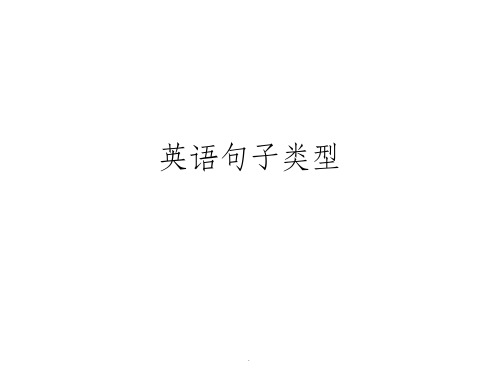
helped us to overcome difficulties. • 2.表示转折关系,常用连词有but,however, yet(然
而),while(而)等。 • ①He is young, but he works hard. • ②She is tall, while her elder sister is short.
.
并列句
• 3.表示选择关系,常见连词有or,not...but(不是…… 而是……),either...or...(要么……要么……)等。
关系词whose实际上是先行词的所有格
4.The school where I study is far from my home.
I
bought
a hat
yesterday.
The children ran
home.
We
ate
our meal
in silence.
The car
stopped
suddenly.
.
并列句
• 由并列连词把两个或两个以上的简单句连接起来的句子叫 并列句。常见分类:
• 1.表示同等、平行或承接关系,常用连词有and, both...and...,not only...but also..., neither...nor...,as well as等。
The teacher asked me to read the passage. 6. There be句型:
There is a book on the desk. There existed many dinosaurs.
高考英语语法复习 ---简单句并列句复合句
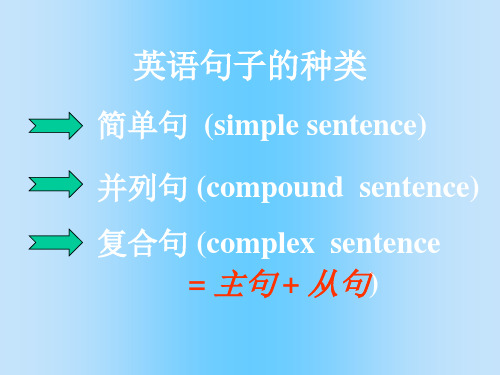
(武汉调研4月) Put yourself in situations where you will be forced to communicate in English, ___ you will see more progress over time. A. or B. so C. yet D. and (崇文4月) You must get up early in the morning, ___ we’ll have to leave without you A.and B. but C. or D. so
英语句子的种类
简单句 (simple sentence) 并列句 (compound sentence)
复合句 (complex sentence = 主句 + 从句)
简单句的五种基本句型
• 主语 + 不及物动词 ( S + Vi ) • 主语 + 及物动词 +宾语 ( S + Vt + O) • 主语 + 系动词 + 表 (S + LV + predicative) • 主语+双宾动词+间宾+直宾(S +Vt +O.indir+O. dir) • 主语 + 宾补动词 +宾语 +宾语补语 • (S + Vt. + O + O. compl) •There + be / stand/ lie / live...
其它平行结构:not…but…, either…or…, neither…nor, not only…but also…, would rather…than…(宁愿……不愿 ……), rather than(而不), as well as(既……也……)等。
简单句-并列句-复合句
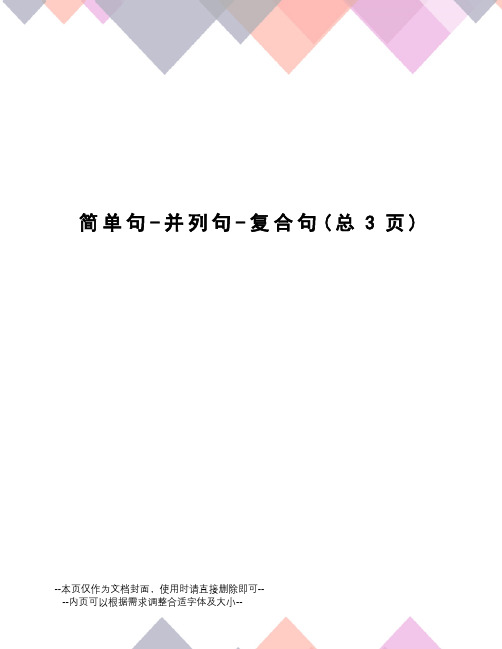
简单句-并列句-复合句(总3页)--本页仅作为文档封面,使用时请直接删除即可----内页可以根据需求调整合适字体及大小--简单句、并列句和复合句一句子可以分为简单句、并列句和复合句:1) 简单句:有时句子虽长, 但只有一个主谓结构, 仍是简单句, 例如:Yesterday we went to an exhibition on the life and work of Lenin, the great revolutionary leader of the working class.有时一个句子有两个(或两个以上)并列的主语或谓语, 也仍然是简单句There he was a leader of the student movement and took an active part in revolutionary work. Both the teachers and the students were very active in physical labour.Comrade Yang and I often study together and help each other.2) 并列句:一个句子如果包含两个或更多的互不依从的主谓结构, 就称为并列句。
He was always close to the people, and the people loved him.I didn't make any mistakes in the test, but my handwriting was poor.Some are walking by the lake, others are sitting on the benches and chatting.并列的各个部分(即各个主谓结构)称为分句。
各个分句用并列连词(如 and, but 等)连接;在上下文紧密联系的情况下也可不用连词, 而以逗号隔开(如上面第三句)。
简单句、并列句和复合句的区别

简单句、并列句和复合句的区别在英语中,句子根据句子结构可以分为:简单句、并列句和复合句。
你知道要怎么区别简单句、并列句和复合句吗?接下来,店铺跟你分享简单句、并列句和复合句的区别方法。
如何区分简单句、并列句和复合句简单句、并列句和复合句的区别一、简单句当一个句子只包含一个主谓结构时,我们称之为简单句。
The train(主语) has just touched down(谓语).在英语中,最基本的句型大体上有五种。
1. S+Vi:主语+不及物动词She sat down beside me.2. S+V+P:主语+系动词+表语Mother isn't in at the moment.3. S+Vt+O:主语+及物动词+宾语I hope to finish the work today.4. S+Vt+OI+OD:主语+及物动词+间接宾语+直接宾语My uncle gave me a camera.5. S+Vt+O+C:主语+及物动词+宾语+宾语补足语The news made us sad.备注:S:主语Vi:不及物动词Vt:及物动词O:宾语OD:直接宾语OI:间接宾语C:宾语补足语二、并列句两个或两个以上独立的主谓结构或简单句并列在一起,我们称之为并列句。
各个简单句间是平行并列的关系,而非从属关系。
并列句的各个分句间可用逗号、分号、起连接作用的副词或并列连接词来连接。
1. 能连接并列句的连词and(和,又),but(但是),for(因为),however(然而),or(或者),so(所以,因而),while(然而),yet(然而)2. 能连接并列句的复合连词or else(否则,要不然),either...or...(要么···,要么···;或者···,或者···),neither...nor...(既不···,也不···),not only...but also(不仅···,而且···)3. 能连接并列句的副词besides(而且,还有),hence(因此),otherwise(否则,要不然),then(然后,于是),therefore(因此,所以),thus(因而,从而) 根据并列分句之间的不同关系,并列句则可以分为以下四种。
英语简单句、并列句、复合句
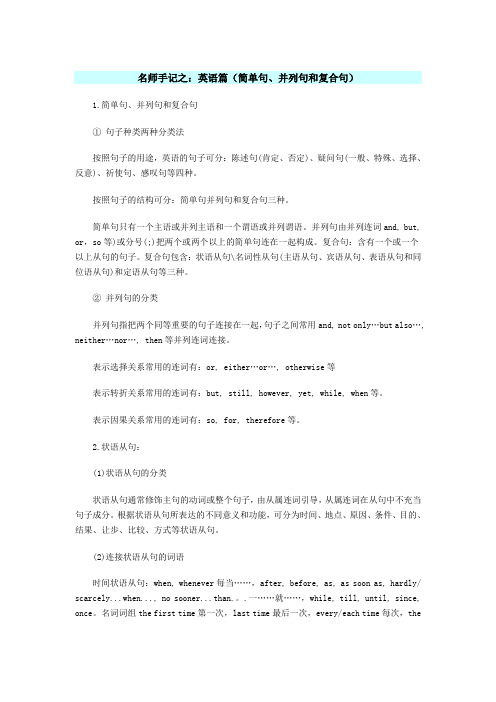
名师手记之:英语篇(简单句、并列句和复合句)1.简单句、并列句和复合句① 句子种类两种分类法按照句子的用途,英语的句子可分:陈述句(肯定、否定)、疑问句(一般、特殊、选择、反意)、祈使句、感叹句等四种。
按照句子的结构可分:简单句并列句和复合句三种。
简单句只有一个主语或并列主语和一个谓语或并列谓语。
并列句由并列连词and, but, or,so等)或分号(;)把两个或两个以上的简单句连在一起构成。
复合句:含有一个或一个以上从句的句子。
复合句包含:状语从句\名词性从句(主语从句、宾语从句、表语从句和同位语从句)和定语从句等三种。
② 并列句的分类并列句指把两个同等重要的句子连接在一起,句子之间常用and, not only…but also…, neither…nor…, then等并列连词连接。
表示选择关系常用的连词有:or, either…or…, otherwise等表示转折关系常用的连词有:but, still, however, yet, while, when等。
表示因果关系常用的连词有:so, for, therefore等。
2.状语从句:(1)状语从句的分类状语从句通常修饰主句的动词或整个句子,由从属连词引导,从属连词在从句中不充当句子成分。
根据状语从句所表达的不同意义和功能,可分为时间、地点、原因、条件、目的、结果、让步、比较、方式等状语从句。
(2)连接状语从句的词语时间状语从句:when, whenever每当……,after, before, as, as soon as, hardly/ scarcely...when..., no sooner...than.。
.一……就……,while, till, until, since, once。
名词词组the first time第一次,last time最后一次,every/each time每次,thenext time下次,the next day第二天, the moment, the minute, the second, the instant 一……就……;副词immediately, instantly, directly等也可作连词使用。
简单句,并列句,复合句

十、简单句1、简单句的特点:简单句通常只由一个主语(或并列主语)和一个谓语(或并列谓语)构成。
2、简单句的种类:简单句一般分为陈述句、疑问句、感叹句和祈使句四种。
3、陈述句:用来说明一个事实的句子叫陈述句。
它有肯定式和否定式两种形式。
▲陈述句的肯定式:He is a middle school student.(他是个中学生)/ I have a hammer in my hand.(我手上有把锤子)/ She teaches us geography.(她教我们地理)/ The new play was good enough and everybody enjoyed it.(新的话剧非常好大家都喜欢)▲陈述句的否定式:1)谓语动词如果是be 、助动词、情态动词时,在它们的后面加“not”。
如:My brother is nota teacher.(我的弟弟不是教师)/ He does not have a cousin.(他没有堂兄弟)/ I will not go there tomorrow.(明天我不去那儿)/ My mother is not cooking a meal in the kitchen.(我母亲现在不在厨房里做饭)/ You must not make such mistakes again.(你不该再犯类似错误了)/ We haven’t discussed the question yet(我们还没有讨论那个问题呢).2)谓语动词如果没有上述词语而是其他动词时,须在它的前面加do not(don’t).如:I don’t know anything about it.(此事我一无所知) / Li Ming does not feed pigs in the countryside.(李明不在农村养猪)/ We didn’t expect to meet her right here.(我们没指望着在这里见到她)/ We didn’t have a meeting yesterday afternoon.(昨天下午我们没有开会)3)如果“have”作“有”讲,也可以在它后面加not构成否定式,其形式与have got的否定式相同。
句子种类
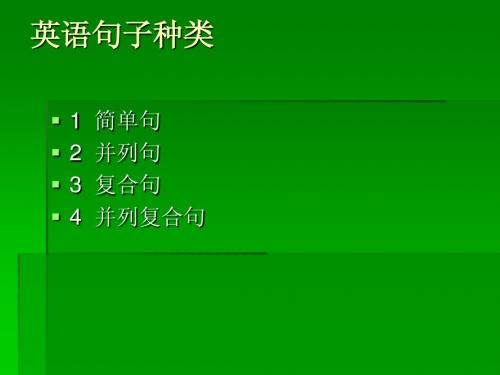
基本句型(二) 主语+谓语(不完全的不及物动词,即 联系动词+表语)
1.This is our classroom. 这是我们的教室. 2.It is bright and clean. 它明亮又清洁. 3.My parents are both teachers. 我的父母都是教 师. 4.The story is very instructive. 这故事很有教育意 义. 5.School is over. 放学了. 6.We were all out. 我们都外出了. 7.Tom looks young. 汤姆显得年轻.
(1)I help her and she helps me.我帮她,她 帮我. (2) He is very old but he is in god health.他 年纪很大了,但他身体很好. (3)we must hurry, or we’ll be late.我们得快 走了, 不然就晚了. (4) I am tried, so I have to go to bed.
6.I found him honest.我发现他为人诚实. 7. We all thought her so nice and sincere. 我们觉得她和善诚恳. 8. The workers are paining the wall white. 工人们正在把墙刷白. 9. She has got supper ready. 她已经把晚餐准备好了
基本句型(四) 主语+谓语(及物动词,接上宾语意义 还不完全)+宾语+宾语补足语
1.We call him Tom. 我们叫他汤姆. 2.The news made me happy.这消息使得我高兴. 3. We elected Li Ming monitor.我选举李明为班长. 4. We always keep our classroom clean.我们经常 保持教室的清洁. 5. His father named him Peter.他的父亲给他取名 为彼得.
简单句、并列句和复合句

简单句、并列句和复合句句子按结构可分为简单句、并列句和复合句。
复合句中包含宾语从句、状语从句或定语从句等。
◆一简单句简单句就是只包含一个主谓结构的句子,其句式结构主要有五种:①主 + 谓。
He works in a big company. 他在一家大公司工作。
②主 + 系 + 表。
She is a kind girl. 她是一个善良的女孩。
③主 + 谓 + 宾。
Ann eats junk food twice a week .安一周吃两次垃圾食品。
④主 + 谓 + 间宾 + 直宾。
He gave me a pen .他给我一支钢笔。
⑤主 + 谓 + 宾 + 宾补。
He kept me waiting for two hours .他让我等了两小时。
◆二并列句并列句由两个或两个以上的简单句连接而成。
并列句中的各简单句同等重要,没有从属关系,是并列的关系,之间用并列连词连接。
1. 表示顺承的并列连词有and / not only …but (also)等。
如:She not only gaveus a lot of advice, butalso helped us to overcome difficulties .他不仅给了我们很多建议,而且还帮助我们克服困难。
2. 表示选择的并列连词有or,either …or …等。
如:Either you or Maria will haveto go .你或玛丽亚得去一趟。
3. 表示转折的并列连词有but,yet,however 等。
如:It is hot in summer here , butit’s not cold in winter .这里夏天热,但冬天不冷。
4. 表示因果关系的并列连词有so,如:He works hard , so he is one of the topstudents in our class .因为他学习努力,所以他是我们班最优秀的学生之一。
英语句子分类之简单句,并列句和复合句

英语句子结构分类英语句子结构分类:简单句,并列句和复合句的概念及区别1.简单句:无论句子长短,只包含一套主谓结构,句子中个个成分都是单词或短语。
有时主语或谓语可以是并列结构。
请划出下面句子的主谓宾成分。
The accident happened yesterday afternoonOur English teacher is thirty years old.He put the dictionary in the backpack.Grandma told me an interesting story last night.She kept the door open.My classmates and friends all received my Christmas cards and thanked me very much.2.并列句: 由并列连词and/but/or/so/however/for等把两个或两个以上的简单句连接起来。
如:Come here and I’ll help you. 请划出两个分句并判断各分句的成分。
并列连词:一、表转折的并列连词主要有but(但是), yet(可是), while(而,却)等二、表选择的并列连词主要or (或者,还是,否则), either, or (不是、就是), neither, or,(既不、也不) otherwise (要不然)等。
三、表联合的并列连词主要有and, not only, but also,(不但,而且), when(=and just at this time 就在这时)等。
四、表因果的并列连词主要有for(因为), so(因此)等。
并列句例句:1. This is the custom of China. They are not like us to finish it in one drink, _____but_____prefer to drink by taking a small amount at a time.2. My mother wants to decorate our rooms in a modem look__while_____my father prefers a traditional style.3. It was time for her to have a new baby, ___and____it was also time for the young panda to independent.4. He is a shy man,__but/yet_______he is not afraid of anything or anyone. 解析:But/yet转折连词。
简单句、并列句、复合句
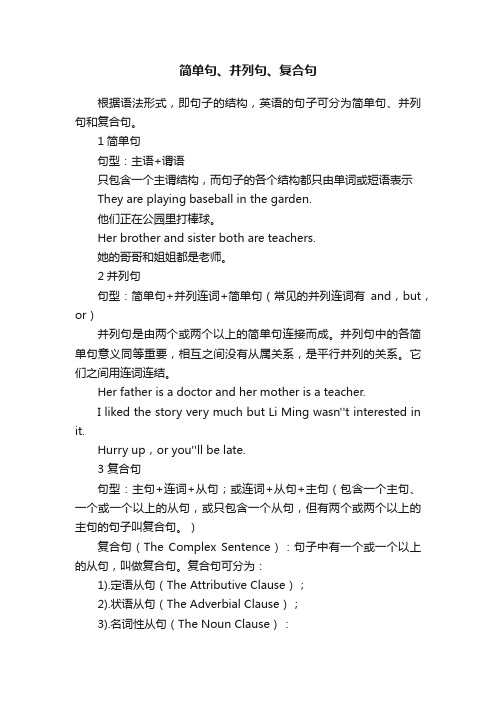
简单句、并列句、复合句根据语法形式,即句子的结构,英语的句子可分为简单句、并列句和复合句。
1简单句句型:主语+谓语只包含一个主谓结构,而句子的各个结构都只由单词或短语表示They are playing baseball in the garden.他们正在公园里打棒球。
Her brother and sister both are teachers.她的哥哥和姐姐都是老师。
2并列句句型:简单句+并列连词+简单句(常见的并列连词有and,but,or)并列句是由两个或两个以上的简单句连接而成。
并列句中的各简单句意义同等重要,相互之间没有从属关系,是平行并列的关系。
它们之间用连词连结。
Her father is a doctor and her mother is a teacher.I liked the story very much but Li Ming wasn''t interested in it.Hurry up,or you''ll be late.3 复合句句型:主句+连词+从句;或连词+从句+主句(包含一个主句、一个或一个以上的从句,或只包含一个从句,但有两个或两个以上的主句的句子叫复合句。
)复合句(The Complex Sentence):句子中有一个或一个以上的从句,叫做复合句。
复合句可分为:1).定语从句(The Attributive Clause);2).状语从句(The Adverbial Clause);3).名词性从句(The Noun Clause):一、定语从句定语从句的定义定语从句在句子中作定语,用来修饰一个名词、名词词组或者代词。
先行词和引导词被修饰的名词、名词词组或代词叫做先行词;在先行词和定语从句之间起连接作用的词叫做引导词。
引导词分为“关系代词”和“关系副词”。
关系代词和关系副词关系代词有:who, whom, whose, that, which, as。
简单句并列句复合句复合并列句的区别与特点归纳
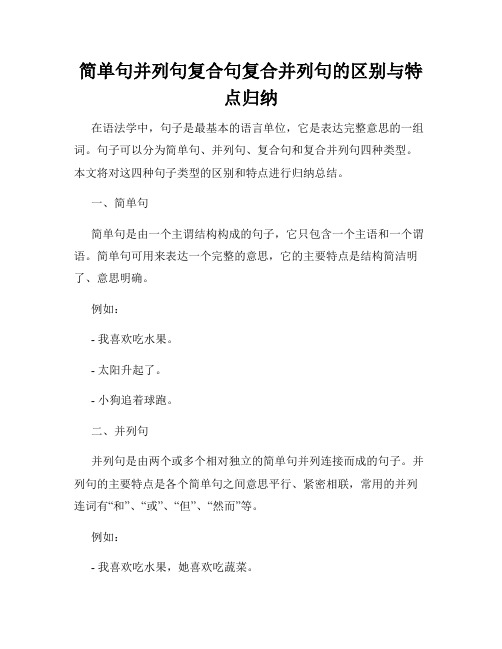
简单句并列句复合句复合并列句的区别与特点归纳在语法学中,句子是最基本的语言单位,它是表达完整意思的一组词。
句子可以分为简单句、并列句、复合句和复合并列句四种类型。
本文将对这四种句子类型的区别和特点进行归纳总结。
一、简单句简单句是由一个主谓结构构成的句子,它只包含一个主语和一个谓语。
简单句可用来表达一个完整的意思,它的主要特点是结构简洁明了、意思明确。
例如:- 我喜欢吃水果。
- 太阳升起了。
- 小狗追着球跑。
二、并列句并列句是由两个或多个相对独立的简单句并列连接而成的句子。
并列句的主要特点是各个简单句之间意思平行、紧密相联,常用的并列连词有“和”、“或”、“但”、“然而”等。
例如:- 我喜欢吃水果,她喜欢吃蔬菜。
- 他去了图书馆,我去了电影院。
- 他很努力,但是考试还是没及格。
三、复合句复合句是由一个主句和一个或多个从句组成的句子。
从句在句意上不能独立存在,它需要依附于主句来完成意义表达。
复合句的主要特点是由主句和从句构成,意思相对复杂,能够表达更多的信息。
例如:- 我希望能去旅行的地方是海滨城市。
- 她告诉我,她买到了一本好看的书。
- 明天我会去看电影,如果天气不好就改成去购物。
四、复合并列句复合并列句是将并列句和复合句结合起来的句子类型,它由两个或多个主句以及一个或多个从句组成。
复合并列句的主要特点是同时包含了并列句和复合句的特点,既有并列句中简洁明了的结构,又有复合句中丰富多样的语义。
例如:- 我喜欢吃水果,但是我不喜欢吃苹果。
- 我的朋友告诉我,他要出国旅游,而且他会去很多有趣的地方。
- 我今天想去看电影,或者我可以跟你一起去爬山。
综上所述,简单句、并列句、复合句和复合并列句是四种常见的句子类型。
简单句结构简洁,意思明确;并列句由多个简单句并列连接,意思平行;复合句由主句和从句构成,意思相对复杂;而复合并列句则同时包含并列句和复合句的特点。
不同类型的句子用于不同的语言表达需要,准确理解和运用它们有助于提高表达能力,使语言更加丰富生动。
英语中三类句子--简单句、并列句、复合句

英语中的三类句子分类研究无疑是广大学习者比较青睐的一种学习方法,那么英语中这么多句子是否能够进行分类学习呢?这也许就是英语句法的显著特征之一,英语中的句子结构严谨,而且种类并不繁多。
在英语中,无论句子有多长,所表达的意思有多繁复,那么从结构上来说,只有三类句子,即简单句、并列句、复合句。
简单句:有且只有一个可成句的SV结构构成。
当然,简单句并不一定就是短的句子,只是从结构上来看,简单句只有一个SV结构,并且在句型上只能是SV 结构的五大句型之一,但是在句子中可以有各种各样的修饰成分或次修饰成分,只要修饰成分局限于SV结构以下的语言单位(单词、短语、with的复合结构或独立主格结构)就行,因此,简单句亦有可能很长。
Money talks.财大气就粗。
A timely snow promises a good harvest.瑞雪兆丰年。
The high-minded man does not bear grudges.品格高尚的人不怀恨。
Virtue is its own reward.施恩无他图,有德便是报。
美德本身就是报偿。
Man’s dearest possession is life.人生最宝贵的是生命。
Custom makes all things easy.习惯成自然。
I have nothing to offer but blood, toil, tears and sweat.我能奉献的唯有热血、辛劳、泪水和汗水。
Creativity and intelligence can make the world a better place.创造力和聪明才智可以让世界日益美妙。
The snow in North China may last a whole day, breaking tree branches and blockingthe road.在中国北方,降雪可能持续一整日,积雪压断树枝,堵塞道路。
句子结构:简单句,并列句,复合句

He robbed me of a necklace.
The doctor cured her of cancer.
▲主语+谓语+宾语+补语
常见的宾语补足语有:形容词、副词、介词短语、名词、不定式、分词
eg. I made my sister angry. 主 谓 宾 补(形容词) They saw a puma running after them. 主 谓 宾 补(现在分词) I heard the window broken. 主 谓 宾 补(过去分词)
并列句 将几个简单句连接起来构成并列句,不存在单独的主句和从 句;各小句根据上下文的要求按逻辑次序排列,但各小句同 等重要并独立存在。
连接方式:
♥ 用分号,两个分句有逻辑关系
eg. We fished all day;we didn't catch a thing.
主
谓
状语
主
谓
Байду номын сангаас
宾
♥ 用连接副词,后常用逗号
分词
分词作状语时,一般在句子中作时间、原因、方式或伴随等状语。 分词作状语时,句子的主语就是该分词的逻辑主语。 现在分词: 1. 作后置定语,相当于定语从句 2.作伴随状语 (主语与主干的主语一致) 与主语为主动关系,所表示的动作一般与句中谓语动词所表示的动作同时发生 The manager acting for the company was in direct relation with the laborers. 后置定语 Playing basketball, Tom saw a stranger. 伴随状语 主句 Not having received a reply, he decided to write again. 原因状语 Crossing the road, I saw a girl crying. 时间状语 Being a child, he can’t enter into the interbar 原因状语
中考英语简单句并列句复合句考点讲解及练习

简单句、并列句和复合句考点一简单句1.简单句只包含一个主谓结构.2.五种简单句:1)主+谓. He comes at last.2)主+系+表. She is a teacher.The soup tastes nice.3)主+谓+宾. They reached the village.4)主+谓+间宾+直宾. He gave me a pen.5)主+谓+宾+宾补. I find that book very useful.考点二并列句并列句:两个或两个以上的简单句,用连词连接起来;常用的连接词有:1.表示顺承关系的:and, not only…but also不仅….而且….等;She ______ gave us a lot of advice, _______ helped us to overcome difficulties.Linda tried to become an excellent teacher, _____ at last she succeeded.2.表示选择关系和否定条件的有or还是,否则Do you want to leave now ____ would you rather set off laterWear your coat, ____ you’ll catch a cold.3.表示转折关系的有but, yet等;He is young, but he works hard.虽然他年轻,但工作努力;4.表示因果关系的有for, so 等;My leg hurts so I go to see a doctor. 我的腿疼,因此我去看医生;考点三主从复合句:宾语从句1.宾语从句的引导词1引导陈述句用 that在口语和非正式文体中常常省略He tells me that he is going shopping this Sunday.2 引导一般疑问句用if或whether.She asked me if\ whether she could join us. whether…or not3 引导特殊疑问句,要用原来的特殊疑问词;She asked them what they were doing.2.宾语从句的语序:要用陈述句语序;I want to know when the train left.3. 宾语从句的时态1主句是一般现在时,一般将来时或祈使句,宾语从句可根据实际需要选用各种时态;He tells us that he has been able to look after himself.(2)主句是过去时态,宾语从句应使用过去时的相应时态;They said that they had already finished the work.(3)如果宾语从句叙述的是客观事实、真理、自然现象等,不管主句用什么时态,从句都用一般现在时;He said that light travels faster than sound.3. 练习1She asked me, “Will you go to the cinema tomorrow”改为含宾语从句的复合句She asked me______ I ______ go to the cinema the next day.2 How lovely the dog is Can you tell me _____A. where did you get itB. where will you get itC. where you got it3 --- Can you tell me _____ your parents at home--- I often wash clothes and sweep the floor.A.how will you helpB. how you helpC. how will you helpD. howdo you help4 When I was young, my grandfather told me that the sun ______ rise in the east.考点四状语从句一、状语从句在复合句中作状语,修饰主句中的动词、形容词、副词等;1.地点状语从句地点状语从句通常由 where 引导;Put all the things _____they were.A. whereB. whenC. whoseD. which2.时间状语从句主句用将来时,从句用一般现在时时间状语从句的引导词有when, before, after, until, as soon as, since, while, as 等She was cooking when someone knock at the door.What will you do after you finished your homework3.条件状语从句在条件状语从句中,常用的引导词有if, unless等;If it dosen’t rain, I” ll go fishing.They will have a picnic unless it rains next Sunday.4.原因状语从句原因状语从句常用的引导词有because, as, since既然等He didn’t come because he was ill.Since we are students, we should study hard.Because 和so 不能在一个句子中同时使用;5. 结果状语从句结果状语从句主要由so…that…, such…that…引导;It’s so hot that we want to go swimming.That’s such an interesting story that everybody likes it.So… that…与简单句之间的句型转换1)that后的句子是否定句,常用too…to进行转换;He is so young that he can’t go to school. he is too young to go to school.2)that后的句子是肯定句;常用enough to 进行转换;The shirt was so cheap that he bought it. the shirt was cheap enough for him to buy.6.目的状语从句目的状语从句常用的引导词有so that, in order that 等 in order to 简单句Please say it in a loud voice so that everyone can hear it.He works harder in order that he can go to a good college.7. 让步状语从句引导词有though, although, even if, even though尽管等;He often helps others though\ although he is not rich.They will stand by you even if you don’t succeed.Though, although与but 不能同时出现在一个句子中8.比较状语从句比较状语从句由than, as…as…, not as\so… as等引导;比较级He is more outgoing than I.He ran as fast as Mike.二、练习1. It’s quite common in Britain to say “thank you”to the drivers _____ people get off the bus.a. afterb. sincec. untild. when2. The art club is for members only. You can’t go in ____you are a member.a. unlessb. becausec. ifd. though3. Now many parents send their children to foreign countries, _____ they want them to get a better education.a. untilb. thoughc. because4. ---- What would some students like to do after finishing their education---- They would like to start to work_______ they needn’t depend on their parents completely.a. as soon asb. so thatc. befored. while考点五定语从句修饰某一名词或代词的从句叫定语从句;被定语从句修饰的词叫先行词,引导定语从句的词叫关系词关系代词和关系副词;1.关系代词的基本用法The man __________spoke at the meeting is from Hong Kong. 指人作主语The building ___________is being built will be used as a hospital.指物作主语I visited a scientist _______ name is known all over the world. 指人作定语2. 关系代词特殊用法1当关系代词在从句中作主语时,从句的谓语动词要与先行词保持一致;He is one of the boys who ______ like playing football.He is the only one of the boys who________ like playing football.2 通常以下四种情况关系代词只能用that而不能用which.1 先行词为all, much, something, everything, nothing, little, none, the one 等不定代词时2先行词被形容词最高级修饰时;3当先行词被the only, the very, the just等修饰时;4先行词中既有人又有物时;3. 关系副词的基本用法;1 when 在句中作状语,表示时间;2 where 在句中作状语,表示地点;.3 why 在句中作状语,表示原因;He remembers the day _______ he joined the League.This is the reason_______ he is late today.This is the place _______ Lu Xun was born.1. 2011泰安--- _______do you read English newspapers---I read China Daily every day.A. How longB. How soonC. How oftenD. How far2.2011抚州John had a short walk after lunch, _______A. did heB. didn't heC. had heD. hadn't he3.2011宁波--- _______do you have an Art Festival in your school---Once a year.A. How longB. How oftenC. How farD. How soon4.2011安徽省If you want to go to see the movie this evening, so _______I.A. doB. amC. willD. should5.2011长沙 _______tall the girl isA. HowB. HowaC. WhatD. What a6.2011长沙 _______ call me Mimi It's my cat's name.A. NotB. Didn'tC. Doesn'tD. Don't7.2011长沙They went to the park yesterday,_______A. don't theyB. didn't theyC. aren't theyD. can't they8.2011福州---Li Mei usually helps others, _______---Yes, she is kind-hearted.A. does sheB. is sheC. doesn't she9.2011眉山There _______an English party in our school tomorrow evening.A. haveB. will haveC. is going to haveD. will be10. 2011济南--- _______a year does your school have sports meetings---Twice a year.A. How oftenB. How soonC. How longD. How many times11. 2011泰州---I have changed my job.---_______.A. So do IB. So have IC. So I doD. So I have12. 2011济南Mike learns a lot about Internet. And _______.A. I don't, eitherB. so do IC. so am I am, too13. 2011眉山Jim never goes to the movies on Saturday, _______A. does JimB. doesn't JimC. doesn't heD. does he14. 2011玉州You've just finished your listening exam Please getyourself ready for the next part, _______A. shall weB. will youC. do youD. are you15. 2011眉山--- _______the weather like last Monday---It was sunny.A. How wasB. What'sC. What wasD. How is16. 2011潍坊_______great scientist Qian Xuesen isA. HowB. HowaC. WhatD. What a17. 2011眉山--- _______do you visit your grandparents---Once a month.A. How soonB. How longC. How muchD. How often18. 2011内江--- _______ do you speak English so well---Because I practice it with my partner every day.A. WhyB. WhenC. Who19. 2011泉州---We'll go to Qing Yuan Mountain tomorrow. Why _______join us---That's a good idea.A. notB. don'tC. can'tD. didn't20. 2011泉州There is little milk in the glass, _______A. is thereB. isn't thereC. isn't itD. does it21. 2011肇庆The students in Class Two played basketball against ClassOne yesterday,_____A. did theyB. didn't theyC. weren't they22. 2011宁波---What a new computer Can you tell me_______---Just the day before yesterday.A. how much you paid for itB. how much did you pay for itC. when you bought itD. when did you buy it23. 2011泰安---Tom wants to know if you will have a picnic tomorrow.---Yes. But if it _______, we'll play chess instead.A. will rainB. rainedC. is rainingD. rains24. 2011烟台---Do you know this dictionary belongs to---Let me see. Oh, it's_______.A. who does; mineB. who; meC. whose; mineD. who; mine25. 2011杭州Franklin told them all _______to be in Britain again.A. he was how happyB. how happy he wasC. how was he happyD. he was happy how26. 2011湖州---What kind of movies do you like---I like the movies_______ are about Chinese history.A. whoB. whomC. whoseD. that27. 2011丽水---Do you know _______---Sorry, I don't have a watch.A. whose watch this isB. whose watch is thisC. what time it isD. what time is it28. 2011重庆The woman asked the policeman where _______.A. the post office isB. the post office wasC. is the post officeD. was the post office29. 2011泰安---Can you guess_______ the new schoolbag yesterday.----Sorry, I've no idea.A. how much did he pay forB. how much he spentC how much he paid for D. how much did he spend30. 2011杭州Who is the man_______ is reading a book over thereA. thatB. whichC. whoseD. what31. 2011湖州---Do you know_______---Next Sunday.A. what they will doB. where they will doC. when they will come hereD. who they will meet32. 2011长沙---Can you tell me why_______---Because I want to help the people there.A. do you go to Tibet西藏B. did you go to TibetC are you going to Tibet D. you are going to Tibet33. 2011浙江省---Linda, could you tell me _______---He is an actor.A. what he doesB. what does he doC where he works D. where does he work34. 2011福州---Could you tell me _______---Sure. The day after tomorrow.A. when will you leave for the U.S.A.B. when Mr. Lee will comeC when your father returned35. 2011济南He asked me_______.A. who did kick the first goal in the World CupB. when was the A. PEC meeting heldC when China became a member of the WTOD. where will the 2008 Olympics be held36. 2011玉州Jane is one of the students in the class _______ have everbeen to China.A. whoB. whoseC. whichD. whom37. 2011济宁Can you tell me _______after this examA. what you didB. what did you doC. what will you doD. what you will do38. 2011苏州---Can you tell me how many colours _______ in a rainbow---SevenA. there areB. are thereC. they areD. are they39. 2011潍坊I can't understand _______Apple's iPad 2.A. why are they so mad aboutB. why they are so mad aboutC. how are they so mad aboutD. how they are so mad a。
(完整版)简单句、并列句、复合句、并列复合句
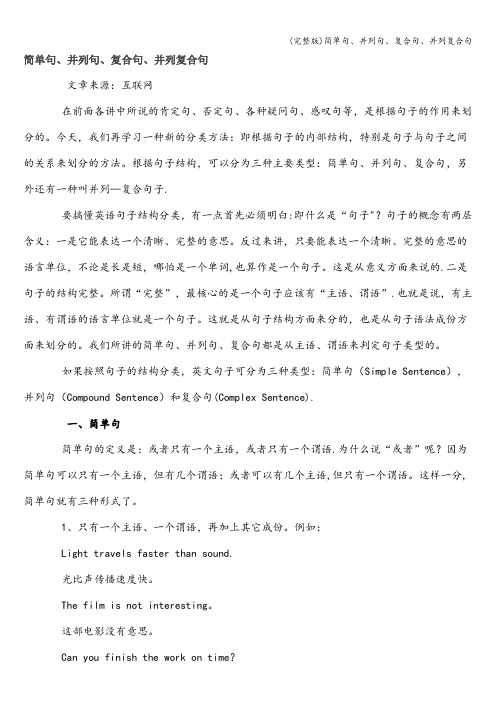
简单句、并列句、复合句、并列复合句文章来源:互联网在前面各讲中所说的肯定句、否定句、各种疑问句、感叹句等,是根据句子的作用来划分的。
今天,我们再学习一种新的分类方法:即根据句子的内部结构,特别是句子与句子之间的关系来划分的方法。
根据句子结构,可以分为三种主要类型:简单句、并列句、复合句,另外还有一种叫并列—复合句子.要搞懂英语句子结构分类,有一点首先必须明白:即什么是“句子"?句子的概念有两层含义:一是它能表达一个清晰、完整的意思。
反过来讲,只要能表达一个清晰、完整的意思的语言单位,不论是长是短,哪怕是一个单词,也算作是一个句子。
这是从意义方面来说的.二是句子的结构完整。
所谓“完整”,最核心的是一个句子应该有“主语、谓语”.也就是说,有主语、有谓语的语言单位就是一个句子。
这就是从句子结构方面来分的,也是从句子语法成份方面来划分的。
我们所讲的简单句、并列句、复合句都是从主语、谓语来判定句子类型的。
如果按照句子的结构分类,英文句子可分为三种类型:简单句(Simple Sentence),并列句(Compound Sentence)和复合句(Complex Sentence).一、简单句简单句的定义是:或者只有一个主语,或者只有一个谓语.为什么说“或者”呢?因为简单句可以只有一个主语,但有几个谓语;或者可以有几个主语,但只有一个谓语。
这样一分,简单句就有三种形式了。
1、只有一个主语、一个谓语,再加上其它成份。
例如:Light travels faster than sound.光比声传播速度快。
The film is not interesting。
这部电影没有意思。
Can you finish the work on time?你能按时完成工作吗?2、只有一个主语,但有几个谓语,再加上其它成份。
例如:The boy were running, shouting and laughing.男孩们一边跑,一边笑,一边喊叫着。
- 1、下载文档前请自行甄别文档内容的完整性,平台不提供额外的编辑、内容补充、找答案等附加服务。
- 2、"仅部分预览"的文档,不可在线预览部分如存在完整性等问题,可反馈申请退款(可完整预览的文档不适用该条件!)。
- 3、如文档侵犯您的权益,请联系客服反馈,我们会尽快为您处理(人工客服工作时间:9:00-18:30)。
9(what he said,是一个主谓结构。What he saidis wrong.是另外一个主谓结构,What he said作主语,is wrong系表结构作谓语,因此,本句是复合句。
What he said是主语从句;what既作从句成分又起着从属连词的作用)
考点3.复合句
A.用从属连词连接的句子是复合句
还先看上面的两个错句:
He likes English, his English is very good.x
His wife was ill, he had to stay at home.x
我们还可以用从属连词来连接。这两句话可改为:
Because he likes En glish, his En glish is very good.
因此,his English is very good”是主句,when he likes English”是时间状语从句。
同理,句②修改后,前面分别为原因状语从句和时间状语从句,后面是主
句。
像上面这样,用从属外一个句子(从句)是说明主要句子发生的时间、原因、条件等,这样构成 的句子称为复合句。
先看第一个句子。当用because连接时,译为“因为他喜欢英语,(所以) 他的英语非常好”。主要说的是“他的英语非常好”,“他喜欢英语”是他英
语好的原因。因此:his English is very good”是主句,because he likes English是原因状语从句。当用when连接时,译为“当他喜欢英语时,他的英语非常 好”。主要说的是“他的英语非常好”,“他喜欢英语”是他英语好的时间。
句子结构和成分
句子分类
Tom and Mikeare American boys.
She Jikes draw ing and often draws pictures for the wall n ewspapers.
(画线部分为并列谓语,只有一个主语,仍为简单句 改错:
It not only costs little money but also comfortable.
He likes En glish, so/a nd his En glish is very good. His wife was ill ; he had to stay at home.用分号连接) His wife was ill, so/and he had to stay at home.
2.The boy who offered me his seat is called Tom.
3.There is a chair in this room, isn't there?
4.My brother and I go to school at half past seven in the morning and come back home at seve n in the eve ning.
2. Whe n he likes En glish, his En glish is very good.
3. Because his wife was ill, he had to stay at home.
4.Whe n his wife was ill, he had to stay at home.
5.He is in Class One and I am in Class Two.
6.He was fond of drawing when he was yet a child.
从上面这几个句子,我们可以看出:
C.一个句子如果含有从句,如名词性从句(主语从句、宾语从句、表语从句和 同位语从句)、定语从句和状语从句等,这个句子就是复合句。
练习1.判断下列句子是简单句、并列句还是复合句。
1.We ofte n study Chin ese history on Friday after noon.
这时我们可以用and, but, or等并列连词来连接这两个句子;也可以用分 号(;)来连接。此时,这两个简单句(此时也可称作 分句)之间是并列关系, 不能说一个分句作了另一个分句的什么成分。
用并列连词或分号连接起来的句子是并列句。
上两句可以改为:
①. He likes English;his English is very good.用分号连接)
5I was doing my homework whe n he came in.
6(I was doing my homework是一个主谓结构,he came in也是一个主谓结构。后面一个主谓结构作前一个的时间状语,是时间状语从句。因此本句是
复合句,when是从属连词。)
7It is wron g.(只有一个主谓结构,是简单句。)
B.当简单句的一个成分从词或词组变为句子时,整个句子就成为复合句了。从
词或词组升级后的句子是从句,除从句以外的是主句,整个句子是复合句。
1The boy over there is my brother.(只有一个主谓结构,是简单句。)
2The boy who is wear ing a hat is my brother.
3(当over there变为who is wearing a hat时,句子就含有两个主谓结构,一个是The boy is my brother,是主句;who is wearing a hat是the boy的定语,称为定语从句。who既作从句成分,又起着从属连词的作用。)
4I was doing my homework at six.(只有一个主谓结构,是简单句。)
考点2.并列句
改错:
1. He likes En glish, his En glish is very good.
2. His wife was ill, he had to stay at home.
当一个句子中含有两个简单句时,就要考虑两个简单句的连接问题了。 直 接用逗号连接两个简单句是错误的。
